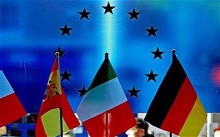|

As many had expected, 2012 turned out to be a busy and volatile year for European politics and economics, with the eurozone crisis hitting new depths and political tensions rising accordingly. Can we expect the same in 2013? Open Europe lays out its view on three key topics to watch in 2013 – discussions of a ‘Brixit’, the formulation of the new eurozone banking union and, of course, the continuation or otherwise of the eurozone crisis.
Open Europe's Head of Economic Research Raoul Ruparel said,
“Next year is not only likely to see domestic politics across the EU clash with the economic realities of the eurozone crisis and EU integration, but also countries increasingly being pitted against one another.”
“Despite talk of a recovery, growth is set to stall and unemployment rise across the continent. But with the easing of the immediate crisis and growing domestic unrest, we could easily see eurozone leaders put off the big decisions on the future of the eurozone.”
To read the full document, ‘What to expect from the EU in 2013’, click on the link below:
http://www.openeurope.org.uk/Content/Documents/Pdfs/EUin2013.pdf
Executive Summary
Section 1: The eurozone crisis – survival but stagnation
If 2012 saw a full on crisis in the eurozone, 2013 is likely to be a year of economic stagnation and political uncertainty, with low growth and high unemployment continuing to plague many countries. There will be fewer threats to the eurozone’s existence than in 2012, but the fundamental flaws in the structure of the eurozone remain, and progress towards solving them is likely to continue to be slow. Italy, Spain and France face funding costs of ?332bn, ?195bn and ?243bn respectively, which will keep markets on edge. On this front, liquidity from the ECB and the potential activation of its bond buying programme, the OMT, will help soothe fears in the first half of the year at least.
However, politics will be the name of the game. In order to get to the OMT, Spain and others will have to go through the ESM, meaning approval by parliaments in several creditor countries including Germany. This could trigger unexpected delays and tensions. Italy, Germany and Austria are also facing important elections, with it being far from clear that the Italian elections, in particular, will produce a stable, pro-reform government. In addition, Portugal, Slovenia and Cyprus could also be forced to seek more financial aid, while the Greek political scene remains very fragile amid growing austerity-fatigue. In combination, political tensions, particularly between the creditors and recipients, could suddenly flare up.
Verdict: A calmer, but still painful year for the eurozone, with several political flashpoints that could quickly trigger a fresh flare-up in the crisis. The eurozone is unlikely to fully turn the corner.
Section 2: Banking union – slow or even slower?
As the eurozone’s flagship solution to the crisis, the banking union will continue to be at the forefront of discussions and disagreements in 2013. The set timetable – which includes a decision on the resolution fund in 2013 – will likely fall foul of political wrangling, with direct recapitalisation of eurozone banks by the ESM already pushed back until after the German elections.
Verdict: A decision on the second step of the banking union – a joint fiscal backstop – is unlikely to be taken amid continued disagreements and domestic pressures.
Section 3: Britain in the EU – a mid-life crisis or full divorce?
On 1 January, the UK will have been an EU member for 40 years, but the relationship is becoming increasingly complicated. A British exit from the EU became a topic of mainstream discussion in 2012 and will continue to be a front-page issue in 2013, with UKIP on the rise and European elections approaching. Though Cameron may not have to seek parliamentary approval for any major EU issue in 2013, there will be tense discussions both within the Coalition and the Conservative party about how to tackle demands for a new relationship with Europe. In his forthcoming Europe speech – scheduled for mid-January – Cameron could well frame the choice for Britain in Europe as one between “renegotiation” and “Brixit”, though may still shy away from promising a concrete referendum. The two issues to watch are how many EU crime and policing laws the UK will remain signed up to, which could be decided next year, and whether Cameron can present a deal on the long-term EU budget as a success.
Verdict: No fundamental changes to the relationship, but positioning and political manoeuvring will set the stage for the 2014 and 2015 elections – that in turn could decide the exact nature of the EU-UK relationship in the future.
|



